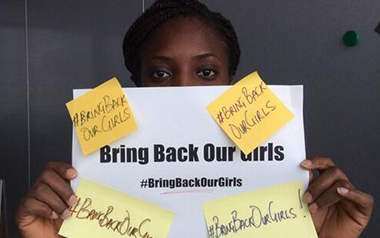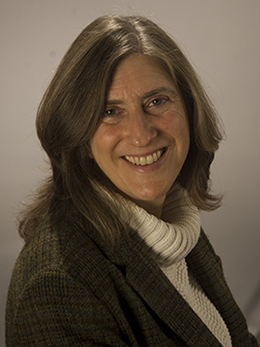The Perfect Viral Storm
 |
|
A Nigerian woman tweeted this picture, joining the hundreds of show business and political figures who supported the 2014 social media campaign #BringBackOurGirls. |
ALBANY, N.Y. (August 14, 2017) — When 276 young girls were kidnapped from their school in Chibok, Nigeria, by heavily armed members of the Islamic extremist group Boko Haram in April of 2014, a social media and e-petitioning phenomenon began, generated by a Nigerian girl’s petition on Change.org. Nicknamed #BringBackOurGirls, it had more than 1.1 million signatories one year later.
Using #BringBackOurGirls as the basis for an investigation into how such electronic petitions gain popularity, a research team led by the Center for Technology in Government (CTG) has found a link between social media efforts and the likelihood that someone will sign an e-petition. The study won a Best Paper award this June at the 18th Annual International Conference on Digital Government Research.
 |
|
Communication professor and CTG fellow Teresa Harrison. (Photo by Mark Schmidt) |
Teresa Harrison, a faculty fellow at CTG and professor of Communication, was lead investigator of the study, supported by Ph.D. students Catherine Dumas and Nic Depaula of Information Science, undergraduate students Will May of Economics and Akanksha Atrey of Computer Science, Jooyeon Lee and Lokesh Rishi, master’s students of Computer Science, Tim Fake, a 2015 Master’s graduate of Computer Science, and Distinguished Teaching Professor Emeritus (computer science) S.S. Ravi.
They looked at the extent to which online media was related to the accumulation of signatures by Ify Elueze, who, just weeks after the Chibok kidnapping, created the electronic petition #BringBackOurGirls. Ify had just two simple goals in mind: Unite the world in efforts to rescue the girls, and express solidarity. One week later, 250,000 people from all over the world had signed on.
Using statistical research methods, the team discovered factors that made Ify’s campaigns go viral:
- Every tweet about the petition generated an average of an additional 38 signatures, supporting the idea that tweeting does encourage more accumulation of signatures;
- Every story appearing in the mainstream online news media (except for blogs) about #BringBackOurGirls stimulated an average of an additional 1,238 petition signatures;
- Mentioning the petition in an online media item of any kind produced an increase in petition signatures of 1,365 per day; and
- As signatures increased, the number of online news/magazine items increased, supporting the idea that the mainstream news media increases coverage of a topic when it is receiving a lot of attention by social media users.
“Our research shows how complicated the current media environment is and how the various forms of media interact to create a viral effect,” said Harrison. “Ultimately, these processes mean that one lone person can influence what many people are able to express their opinions about.”
While any one of the study’s findings may not immediately explain how something can go viral on social media, combining the individual phenomena begins to show a clearer picture. The full award-winning paper can be read here.
![]() For more news, subscribe to UAlbany's RSS headline feeds
For more news, subscribe to UAlbany's RSS headline feeds
A comprehensive public research university, the University at Albany-SUNY offers more than 120 undergraduate majors and minors and 125 master's, doctoral and graduate certificate programs. UAlbany is a leader among all New York State colleges and universities in such diverse fields as atmospheric and environmental sciences, business, education, public health,health sciences, criminal justice, emergency preparedness, engineering and applied sciences, informatics, public administration, social welfare and sociology, taught by an extensive roster of faculty experts. It also offers expanded academic and research opportunities for students through an affiliation with Albany Law School. With a curriculum enhanced by 600 study-abroad opportunities, UAlbany launches great careers.


